|
|
|
Sort Order |
|
|
|
Items / Page
|
|
|
|
|
|
|
| Srl | Item |
| 1 |
ID:
104943
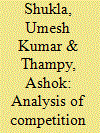

|
|
|
|
|
| Publication |
2011.
|
| Summary/Abstract |
The electricity reforms were initiated in India with the objective of promoting competition in the electricity market. In order to promote competition, the Electricity Act 2003 was enacted and various policy initiatives were taken by the Government of India. Central Electricity Regulatory Commission (CERC) also facilitated competition through the regulatory framework of availability based tariff, Indian Electricity Grid Code, open access in inter-state transmission, inter-state trading and power exchanges. Despite these initiatives, electricity prices increased in the Wholesale Electricity Market in India (WEMI). This paper analyses the market structure and competitiveness in the WEMI. There are, of course, various potential reasons for the rise in the electricity price. This paper seeks to investigate, if market power was one of the reasons for increase in market prices. Concentration ratio, Herfindahl-Hirschman index, Supply Margin Assessment, and Residual Supply Index have been used to measure market power. This paper also uses the price-cost mark-up to examine, if exercise of market power led to higher margins. The analysis suggests that market power of firms may be part of the reason for the increase in electricity prices in WEMI. The study suggests various measures to increase competition in the WEMI.
|
|
|
|
|
|
|
|
|
|
|
|
|
|
|
|
| 2 |
ID:
168688
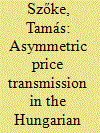

|
|
|
|
|
| Summary/Abstract |
The article compares the market power of Hungarian electricity traders during the partially liberalised transitional market model from 2004 to 2008 and the fully liberalised period lasting since 2008. In our empirical work, we use an econometric modelling technique based on asymmetric price transmission (APT) theory to measure the market power of traders in the electricity market. The aim of our work is to conduct a quantitative analysis of the Hungarian electricity trading market by applying the APT modelling technique – used widely in agro-economic analyses – to electricity markets. The intuition behind the method is the assumption that asymmetric price transmission refers to deviations from perfect competition. The research has found that different regulation regimes lead to different patterns of asymmetry in price transmission and the results underline that the market position of electricity traders have improved since the introduction of the liberalised market model. By mapping the results of the APT model to the actual policy and market changes we argue that the APT method is a useful tool for analysing the competition on electricity markets.
|
|
|
|
|
|
|
|
|
|
|
|
|
|
|
|
| 3 |
ID:
127869
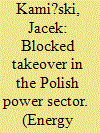

|
|
|
|
|
| Publication |
2014.
|
| Summary/Abstract |
As the President of the Office of Competition and Consumer Protection refused to approve a government initiated takeover in the Polish power sector and the Court of Competition and Consumer Protection did not make a ruling on that case, the takeover was finally prohibited. In this context, the main aim of this paper is to carry out a quantitative analysis of the impact of the takeover in question on electricity prices and quantities, consumer and producer surpluses, dead weight loss and emissions. The scope of the study covers the Polish power generation sector and the analysis was carried out for 2009. A game theory-based electricity market equilibrium model developed for Poland was applied. The model includes several country-specific conditions, such as a coal-based power generation fuel-mix, a large share of biomass co-combustion, etc. For the sake of clarity, only four scenarios are assumed. The paper concludes that the declared synergy savings did not compensate for the increase in dead weight loss and the transfer of surplus from consumers to producers caused by increased market power.
|
|
|
|
|
|
|
|
|
|
|
|
|
|
|
|
| 4 |
ID:
111408
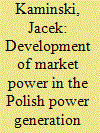

|
|
|
|
|
| Publication |
2012.
|
| Summary/Abstract |
The paper examines how and to which extent consolidation in the Polish power generation sector has affected the potential for market power over the last 10 years. Although this sector has been undergoing liberalisation (privatisation, introduction of TPA regulations and competition etc.), the consolidation efforts shown by Polish governments have resulted in a significant increase in concentration of both installed capacity and production. The methodology applied in this study includes typical ex-post structural and behavioural measures employed to estimate potential for market power, namely: concentration ratios (for the largest and the three largest suppliers), the Herfindahl-Hirschman Index, entropy, Supply Margin Assessment, the Residual Supply Index and the Lerner Index. Furthermore, an analysis based on the Gini coefficient was employed to obtain an insight into inequalities. The results of this study show that governmental decisions led to a significant increase in the potential to exercise market power held by key power generation companies. Of key importance was the 2007 consolidation, resulting in an increase in the HHI to 1374 (in terms of installed capacity) and 1945 (in terms of electricity production). This consolidation resulted in the creation of the first Pivotal Supplier in the Polish power generation sector in 2008.
|
|
|
|
|
|
|
|
|
|
|
|
|
|
|
|
| 5 |
ID:
149983


|
|
|
|
|
| Summary/Abstract |
This paper provides a comprehensive analysis of the market power problem in the Spanish power generation sector and examines how and to which extent the market has developed in terms of market power concerns after the market liberalization reforms. The methodology applied in this study includes typical ex-post structural and behavioral measures employed to estimate potential for market power, namely: concentration ratios (CR) (for the largest and the three largest suppliers), the Herfindahl–Hirschman Index (HHI), Entropy, Pivotal Supply Index, the Residual Supply Index and Residual Demand Elasticity (RDE). The results are presented for the two largest Spanish generating companies (Endesa and Iberdrola) acting in the Iberian Electricity Market (MIBEL), and in the Spanish Day-ahead electricity market. The results show evidence that these companies have behaved much more competitively in recent periods than in the beginning of the market liberalization. In addition, the paper discusses important structural and regulatory changes through market liberalization processes in the Spanish Day-ahead electricity market.
|
|
|
|
|
|
|
|
|
|
|
|
|
|
|
|
| 6 |
ID:
180121


|
|
|
|
|
| Summary/Abstract |
We analyze a drastic price increase in the German auction market for reserve power that did not appear to be driven by increased costs. Studying the market structure and bidding strategies using micro-level bidding data, we find a concentrated market with highly pivotal suppliers in an environment with completely inelastic demand and high entry barriers. We provide descriptive evidence that the price increase was triggered by an abuse of the “guess the clearing price” principle of discriminatory auctions via repeated pretended “bad guessing” of the marginal bid by the most dominant supplier. As intentional “bad guessing” of marginal bids is hard to prove, this suggests that the auction design is crucial for the competition authority's monitoring power – an issue that is often neglected in the discussion on the properties of auction designs. In fact, given regulatory threats, the deemed main advantage of pay-as-bid auctions over uniform price auctions and the popular belief that they reduce dominant suppliers' withholding incentives and diminish their ability to tacitly collude may be questioned in non-static settings. This suggests that pay-as-bid auctions may not necessarily reduce incentives for strategic capacity withholding and collusive behavior, but can even increase them when market power is high and demand inelastic, which is the case in virtually all energy markets.
|
|
|
|
|
|
|
|
|
|
|
|
|
|
|
|
| 7 |
ID:
133213


|
|
|
|
|
| Publication |
2014.
|
| Summary/Abstract |
This paper estimates the relationships between bidding quantities, marginal cost and market power measures in the Spanish wholesale electricity market for two different regulatory periods: 2002-2005 and 2006-2007. Using panel econometric techniques we find differences in the impacts on bidding strategies for both periods. Hence, the marginal cost and the market power measures affect bid and net quantities. The market power measures also suggest that the coefficient is consistently positive and highly significant for both periods.
Moreover, the market power and marginal costs have mixed effects according to the models proposed for both periods. In addition, our results point to the effectiveness of the different effects of mitigating the market power in the Spanish electricity market. For the 2006-2007 period, the proposed causal relationships are partially validated by the cointegration results, which assumes there is a significant causality between the Lerner Index and the marginal cost.
|
|
|
|
|
|
|
|
|
|
|
|
|
|
|
|
| 8 |
ID:
161841
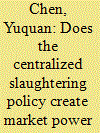

|
|
|
|
|
| Summary/Abstract |
In order to ensure safe meat supply and protect consumers' health, the government of China made a law in 1997 which started to enforce centralized slaughtering of hogs in licensed slaughtering houses. We use a structural model and the industrial level data to test the hypothesis that whether the “centralized slaughtering policy” creates market power. The results detect sizable and significant market power (about 0.5% price margin) for the slaughtering industry in the pork supply chain, mainly due to high barriers of entry and stringent license regulations which reduce competition in the market. The total profit markup for the slaughtering industry reaches 1.85 billion yuan just in 2016. The welfare transfer and loss from market power should be taken into account for such a policy making.
|
|
|
|
|
|
|
|
|
|
|
|
|
|
|
|
| 9 |
ID:
103482
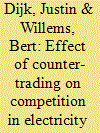

|
|
|
|
|
| Publication |
2011.
|
| Summary/Abstract |
In a competitive electricity market, nodal pricing is the most efficient way to manage congestion. Counter-trading is inefficient as it gives the wrong long term signals for entry and exit of power plants. However, in a non-competitive market, additional entry will improve the competitiveness of the market, and will increase social benefit by reducing price-cost margins. This paper studies whether the potential pro-competitive entry effects could make counter-trading more efficient than nodal pricing. We find that this is unlikely to be the case, and expect counter-trading to have a negative effect on overall welfare. The potential benefits of additional competition (more competitive prices and lower production cost) do not outweigh the distortions (additional investment cost for the entrant, and socialization of the congestion cost to final consumers).
|
|
|
|
|
|
|
|
|
|
|
|
|
|
|
|
| 10 |
ID:
109650
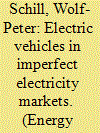

|
|
|
|
|
| Publication |
2011.
|
| Summary/Abstract |
We use a game-theoretic model to analyze the impacts of a hypothetical fleet of plug-in electric vehicles on the imperfectly competitive German electricity market. Electric vehicles bring both additional demand and additional storage capacity to the market. We determine the effects on prices, welfare, and electricity generation for various cases with different players in charge of vehicle operations. Vehicle loading increases generator profits, but decreases consumer surplus in the power market. If excess vehicle batteries can be used for storage, welfare results are reversed: generating firms suffer from the price-smoothing effect of additional storage, whereas power consumers benefit despite increasing overall demand. Strategic players tend to under-utilize the storage capacity of the vehicle fleet, which may have negative welfare implications. In contrast, we find a market power-mitigating effect of electric vehicle recharging on oligopolistic generators. Overall, electric vehicles are unlikely to be a relevant source of market power in Germany in the foreseeable future.
|
|
|
|
|
|
|
|
|
|
|
|
|
|
|
|
| 11 |
ID:
192714
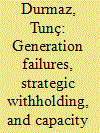

|
|
|
|
|
| Summary/Abstract |
Since the deregulation of significant parts of electricity markets in many countries worldwide, a generally pronounced matter is that firms strategically lower their generating capacity to raise electricity prices. This paper investigates whether strategic capacity withholding exists in the form of generation failures in the Turkish day-ahead market and whether the capacity remuneration mechanism contributes to the failure durations. The empirical results show strong support for strategic capacity withholding in the Turkish market, and the capacity mechanism adds to the duration of these failures. To the best of our knowledge, this is the first study to investigate capacity withholding considering centrally determined capacity prices and to focus on failure durations and the potential amount of power generation losses they cause. Our analysis conveys core messages for policymakers. A random verification mechanism may be implemented to verify that the failures are purely technical and apply penalties for nonperformance. Second, the Turkish capacity mechanism needs to be restructured to make it more compatible with performance incentives. Our analysis, while focused on the Turkish market, provides insights into the prevalent challenges and potential solutions tied to strategic capacity withholding in deregulated electricity markets globally, notably those employing capacity remuneration mechanisms.
|
|
|
|
|
|
|
|
|
|
|
|
|
|
|
|
| 12 |
ID:
090057
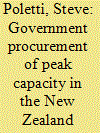

|
|
|
|
|
| Publication |
2009.
|
| Summary/Abstract |
This paper analyzes the impact of government procurement of reserve electricity generation capacity on the long-run equilibrium in the electricity market. The approach here is to model the electricity market in a context where the supply companies have market power. The model is then used to analyze the impact of government direct supply of peak capacity on the market. We find that the firms build less peak-generation capacity when the government procures peak generating capacity. The long-run equilibrium with N firms and government capacity of KG results in an increase of total peak generation capacity of KG/(N+1) compared to the long-run equilibrium with no government capacity. Supply disruptions of baseline capacity during the peak time period are also considered. It is found that peak prices do not go up any further with (anticipated) supply disruptions. Instead the entire cost of the extra peakers is borne by customers on traditional meters and off-peak customers who face real-time pricing.
|
|
|
|
|
|
|
|
|
|
|
|
|
|
|
|
| 13 |
ID:
168346
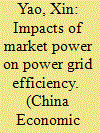

|
|
|
|
|
| Summary/Abstract |
Since 1980s, China has experienced a series of reforms to support the development of electricity industry, and the latest one is in 2015. The essence of this new reform is to improve efficiency and lower energy cost. However, China's electricity market has its particularity. The “provinces as entities” is the main regulation frame in China's electricity sector. The operation of the electricity industry can be seen as a game result and interest compromise between the local government and grid companies, and this “win-win exchange” regulation failure leads to grid market power. The profit mode of the grid enterprises will be gradually changed with the deepening of new electricity reform. How to regulate electricity transmission and distribution sector and improve grid efficiency becomes a crucial problem to address. This paper aims to examine the relationship between market power and power grid efficiency. We calculate the unconditional and conditional efficiency of grid companies by applying a conditional slack-based measure (SBM) model. The empirical results show that grid efficiency is at a low level and the indicators differ among provinces and regions. Moreover, market power indeed has significant negative effects on power grid efficiency. These findings provide some insightful references for the future development of China's power industry and electricity reform.
|
|
|
|
|
|
|
|
|
|
|
|
|
|
|
|
| 14 |
ID:
094853


|
|
|
|
|
| Publication |
2010.
|
| Summary/Abstract |
A number of countries with oligopolistic power industries have used marginal cost pricing to set the price of energy for small customers. This course of action, however, does not necessarily ensure an efficient outcome when competition is imperfect. The purpose of this paper is to study how the auction of long-term contracts could reduce market power. We do so in a two-firm, two-technology, linear-cost, static model where demand is summarized by a price inelastic load curve. In this context we show that the larger the proportion of total demand auctioned in advance, the lower are both the contract and the average spot price of energy.
|
|
|
|
|
|
|
|
|
|
|
|
|
|
|
|
| 15 |
ID:
127818
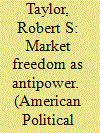

|
|
|
|
|
| Publication |
2013.
|
| Summary/Abstract |
Historically, republicans were of different minds about markets: some, such as Rousseau, reviled them, while others, like Adam Smith, praised them. The recent republican resurgence has revived this issue. Classical liberals such as Gerald Gaus contend that neorepublicanism is inherently hostile to markets, while neorepublicans like Richard Dagger and Philip Pettit reject this characterization-though with less enthusiasm than one might expect. I argue here that the right republican attitude toward competitive markets is celebratory rather than acquiescent and that republicanism demands such markets for the same reason it requires the rule of law: because both are essential institutions for protecting individuals from arbitrary interference. I reveal how competition restrains-and in the limit, even eradicates-market power and thereby helps us realize "market freedom," i.e., freedom as nondomination in the context of economic exchange. Finally, I show that such freedom necessitates "Anglo-Nordic" economic policies
|
|
|
|
|
|
|
|
|
|
|
|
|
|
|
|
| 16 |
ID:
098574
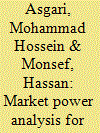

|
|
|
|
|
| Publication |
2010.
|
| Summary/Abstract |
The market power problem in Iranian electricity market is addressed in this study. This paper by using various structural indices of market power and reviewing market results analyzes the intensity of competition in Iran's electricity market and examines whether this market is functioning at an appropriate level of efficiency. In this article the most well-known indices of market power are calculated in two approaches for two different scenarios (current situation and future outlook of generation sector's ownership in Iran's power industry). Comparing the results of these scenarios promises more competitive market for the second scenario. Calculating Residual Supply Index for Iran's power market shows despite admissible values of concentration ratios, due to supply scarcity during periods when the demand is close to the total available capacity, some suppliers can exercise market power even with a relatively small market share. The most important price and load indices like weighted average prices and load/price duration curves of Iranian electricity market during March 2007-March 2008 are also analyzed in this paper. These results imply the existence of economic withholding. The main limiting factors of competition and significant implemented countermeasures for market power mitigation in Iran's electricity market are also mentioned.
|
|
|
|
|
|
|
|
|
|
|
|
|
|
|
|
| 17 |
ID:
125781


|
|
|
|
|
| Publication |
2013.
|
| Summary/Abstract |
Recent greenhouse gas auctions have resulted in base level prices while remaining significantly concentrated. How do dominant firms receive such a large share of emissions allowances without bidding up the market price? This paper provides a Monte Carlo simulation analysis based on a contemporary regional greenhouse gas market in the United States. It introduces a C# simulation software environment, Oligopsony 1.0 that simulates uniform-price emissions auctions in repeated iterations. The results of these simulations indicate that there can be significant non-linearities between profit and market power as exercised through strategic demand reduction. This analysis finds the optimum point of strategic demand reduction that enables firms to exploit these non-linearities. The use of auctions to distribute tradeable pollution rights to firms in heavily concentrated markets can have significant unintended consequences, as it can exacerbate the problems of market power that exist within those markets.
|
|
|
|
|
|
|
|
|
|
|
|
|
|
|
|
| 18 |
ID:
122452
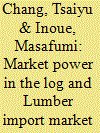

|
|
|
|
|
| Publication |
2013.
|
| Summary/Abstract |
Japan imports rather than exports forestry products even though it has ample forestry resources. Moreover, the leading exporters of forest products often have strong market power in the trade market of forestry products. The possibility of incomplete competition in the Japanese wood import market can also be suspected from the fact that the structure of imports of logs and lumber has remained unchanged over the past 10 years. However, there has been limited empirical economic analysis of the timber trade market to support this assertion.
In this study, we examine the market power of the primary exporting countries in the Japanese log and lumber market based on the residual demand model. We analysed the import data of forestry products from 1988 to 2010 with respect to every main item exported to Japan. The analysis shows that Canada has market power over several items of logs in the Japanese import market, while the United States and Canada have market power over several items of lumber. The study also clarifies that imperfect competition exists in the Japanese timber import market and that the timber price in Japan is partially determined by the exporting countries.
|
|
|
|
|
|
|
|
|
|
|
|
|
|
|
|
| 19 |
ID:
090104
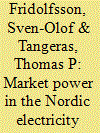

|
|
|
|
|
| Publication |
2009.
|
| Summary/Abstract |
We review the recent empirical research assessing market power on the Nordic wholesale market for electricity, Nord Pool. The studies find no evidence of systematic exploitation of system level market power on Nord Pool. Local market power arising from transmission constraints seems to be more problematic in some price areas across the Nordic countries. Market power can manifest itself in a number of ways that have so far escaped empirical scrutiny. We discuss investment incentives, vertical integration and buyer power, as well as withholding of base-load (nuclear) capacity.
|
|
|
|
|
|
|
|
|
|
|
|
|
|
|
|
| 20 |
ID:
092916
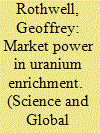

|
|
|
|
|
| Publication |
2009.
|
| Summary/Abstract |
Four firms dominate the international uranium enrichment market. Simultaneously, the nations that host enrichment facilities strongly discourage other nations from developing enrichment capacity, given its potential use in nuclear weapons production. Therefore, these four firms benefit from the exercise of national power to prevent entry into this market. This paper shows that these firms also benefit from increasing returns to scale. In similar national situations, this industry would be regulated or nationalized. This is because free markets do not necessarily lead to a socially optimal long-run equilibrium where the industry is necessarily concentrated, such that there is no proliferating entry, but is sufficiently diverse, so that no one national group can dictate prices, contract terms, or non-proliferation policy. Therefore, some form of international regulation might be necessary to discourage enrichment technology proliferation and assure enrichment supply at reasonable prices.
|
|
|
|
|
|
|
|
|
|
|
|
|
|
|
|
|
|
|
|
|